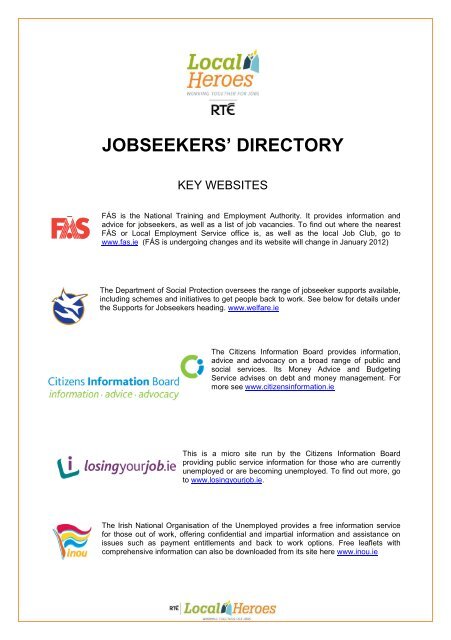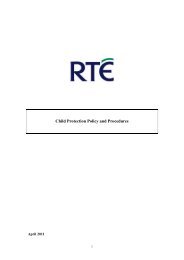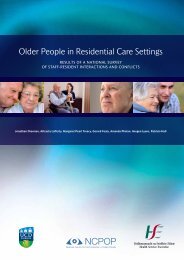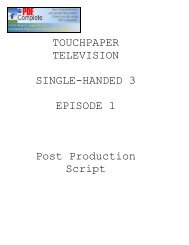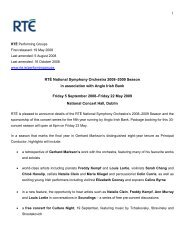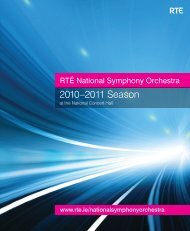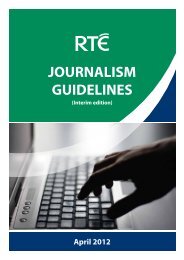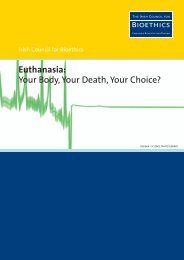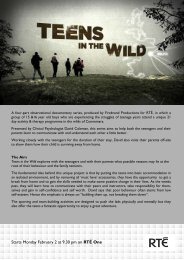JOBSEEKERS' DIRECTORY
JOBSEEKERS' DIRECTORY
JOBSEEKERS' DIRECTORY
You also want an ePaper? Increase the reach of your titles
YUMPU automatically turns print PDFs into web optimized ePapers that Google loves.
JOBSEEKERS’ <strong>DIRECTORY</strong><br />
KEY WEBSITES<br />
FÁS is the National Training and Employment Authority. It provides information and<br />
advice for jobseekers, as well as a list of job vacancies. To find out where the nearest<br />
FÁS or Local Employment Service office is, as well as the local Job Club, go to<br />
www.fas.ie (FÁS is undergoing changes and its website will change in January 2012)<br />
The Department of Social Protection oversees the range of jobseeker supports available,<br />
including schemes and initiatives to get people back to work. See below for details under<br />
the Supports for Jobseekers heading. www.welfare.ie<br />
The Citizens Information Board provides information,<br />
advice and advocacy on a broad range of public and<br />
social services. Its Money Advice and Budgeting<br />
Service advises on debt and money management. For<br />
more see www.citizensinformation.ie<br />
This is a micro site run by the Citizens Information Board<br />
providing public service information for those who are currently<br />
unemployed or are becoming unemployed. To find out more, go<br />
to www.losingyourjob.ie.<br />
The Irish National Organisation of the Unemployed provides a free information service<br />
for those out of work, offering confidential and impartial information and assistance on<br />
issues such as payment entitlements and back to work options. Free leaflets with<br />
comprehensive information can also be downloaded from its site here www.inou.ie
.<br />
This is a micro site of the INOU website containing information about<br />
redundancy entitlements and a link to the Department of Social<br />
Protection’s redundancy calculator. See www.redundancy.ie<br />
Skillnets is a state-funded, enterprise-led body that facilitates training and up-skilling<br />
under the Training Networks Programme. Jobseekers can increase their<br />
employability and make new contacts in industry by receiving training with a Skillnets<br />
network. Jobseekers on Skillnets courses train with those in employment, at no cost<br />
and with no impact on social welfare payments or benefits. See www.skillnets.ie<br />
Local Employment Service Networks – Obair is a community-based organisation set up<br />
under Area Partnerships and funded through FÁS, providing a free, voluntary and<br />
confidential service for local residents, where the response is tailored to meet local<br />
needs. Call into one of its 26 offices around Ireland for more information or visit its<br />
website at www.localemploymentservices.ie/<br />
JobBridge is a new National Internship Scheme providing work<br />
experience placements for interns for a 6 or 9 month period, to<br />
help break the cycle where jobseekers are unable to get a job<br />
without experience. To find out more, go to www.jobbridge.ie<br />
AONTAS is the National Adult Learning Organisation, a non-governmental body, funded by<br />
the Department of Education and Skills, providing information for those interested in returning<br />
to education. To find out more, go to www.aontas.com
Springboard provides free higher education places and training for jobseekers to help them up-skill and<br />
improve their job prospects. Courses are free, part-time<br />
– allowing people keep social protection supports - and<br />
are at certificate, degree and postgraduate level. Find<br />
out more here: http://www.bluebrick.ie/Springboard/<br />
VTOS is the Vocational Training Opportunities Scheme which offers unemployed<br />
people an opportunity to return to structured learning in an adult setting. Funded by<br />
the Department of Education and Skills, it is delivered in over 100 locations<br />
throughout the country by the 33 VECs. Go here: www.vtos.ie<br />
Qualifax is Ireland’s National Learners’ Database, a one-stop shop<br />
for learners, providing comprehensive information on further and<br />
higher education and training courses. Go to www.qualifax.ie<br />
The department’s website has details of job creation<br />
announcements as well as government policies to<br />
address the employment crisis, such as the Action<br />
Plan for Jobs. Find out more at http://www.djei.ie/<br />
The Department of Education and Skills website holds information about<br />
education schemes and initiatives for jobseekers looking to up-skill and retrain<br />
in order to get back to work. FÁS is under the aegis of this government<br />
department. Visit www.education.ie
SUPPORTS FOR JOBSEEKERS<br />
There is a range of supports available from the Department of Social Protection for unemployed people<br />
who wish to engage in enterprise, education and employment. A summary is set out below. For the most<br />
up-to-date, complete details, contact your Local Social Welfare Office or visit the following web link:<br />
http://www.welfare.ie/EN/Pages/unemployed.aspx<br />
Customers who sign-off the Live Register to avail of a short-period of work or training: The Department of<br />
Social Protection operates a fast-tracking system for customers who sign off the Live Register to take up<br />
work for a short period (up to 4 weeks) or to go on a short training course (up to 8 weeks). This ensures<br />
that payment is re-instated without delay.<br />
It is important that you inform your social welfare local office in advance that you are taking up work or<br />
training.<br />
Short-Term<br />
Enterprise<br />
Allowance<br />
(STEA)<br />
SUPPORTS FOR ENTERPRISE<br />
If you are getting Jobseeker’s Benefit (JB) and you wish to set up an enterprise, you may qualify<br />
immediately for the Short Term Enterprise Allowance (STEA.) This would replace your JB with a<br />
weekly payment of a similar amount for the remainder of your JB payment period for a<br />
maximum of either 9 or 12 months, depending on your JB entitlement. Certain secondary<br />
benefits such as your medical card may be retained. The business must be approved in advance<br />
by a Facilitator based in a Social Welfare Local Office or your Integrated Local Development<br />
Company (ILDC)/Partnership Company if you reside in a Partnership or ILDC area.<br />
http://www.welfare.ie/EN/Schemes/JobseekerSupports/BackToWork/Pages/STEA.aspx<br />
Back to Work<br />
Enterprise<br />
Allowance<br />
(BTWEA)<br />
If you are getting a social welfare unemployment payment for at least 12 months and you wish<br />
to set up an enterprise, you may qualify for Back to Work Enterprise Allowance (BTWEA) for<br />
two years. A person on jobseeker’s benefit must have an underlying entitlement to Jobseekers<br />
Allowance (JA) – otherwise the qualifying period is two years. BTWEA would replace your<br />
current social welfare payment with a weekly payment of similar amount in year one and 75%<br />
of that amount in year two. Certain secondary benefits such as your medical card may be<br />
retained. The business must be approved in advance by a Facilitator based in a Social Welfare<br />
Local Office or your Integrated Local Development Company (ILDC)/Partnership Company if you<br />
reside in a Partnership or ILDC area. If you opt for STEA, you cannot transfer to BTWEA.<br />
http://www.welfare.ie/EN/Schemes/JobseekerSupports/BackToWork/EnterpriseAllowance/Pag<br />
es/ea.aspx<br />
Technical<br />
Assistance &<br />
Training Fund<br />
In certain circumstances, grants can be made from the Technical Assistance and Training Fund<br />
to BTWEA and STEA claimants who are establishing an enterprise. Examples include training (in<br />
areas such as bookkeeping and accounts, marketing and computer training). A contribution<br />
towards the cost of Public liability Insurance and small items of essential equipment may also<br />
be made. This scheme is operated by Department of Social Protection Facilitators. You do not<br />
have an automatic entitlement to access the Technical Assistance and Training Fund<br />
http://www.welfare.ie/EN/Schemes/JobseekerSupports/BackToWork/EnterpriseAllowance/Pag<br />
es/ea.aspx<br />
SUPPORTS FOR EMPLOYMENT
Family<br />
Income<br />
Supplement<br />
(FIS)<br />
Family Income Supplement (FIS) is a weekly tax-free payment available to employees on low<br />
pay, with children. It gives extra financial support to people on low pay. To qualify for FIS, your<br />
net average weekly family income must be below a certain limit (based on your family size) and<br />
you must be working at least 19 hours per week or 38 hours per fortnight. The amount you<br />
receive is 60% of the difference between your net family income and the income limit which<br />
applies to your family size.<br />
http://www.welfare.ie/EN/Schemes/BirthChildrenAndFamilies/ChildRelatedPayments/Pages/fi<br />
s.aspx<br />
Working<br />
part-time<br />
and keeping<br />
your<br />
jobseeker’s<br />
payment<br />
Employer Job<br />
(PRSI)<br />
Incentive<br />
Scheme<br />
If you find casual or part-time work, it is possible to work part-time and keep all or part of your<br />
jobseeker’s payment. However you must meet all the other conditions for Jobseeker's<br />
Allowance (JA) or Jobseeker’s Benefit (JB). For example, you must be unemployed for at least<br />
three days out of six and you must pass the means test if on JA. You must also continue to<br />
look for full-time work. If you were self-employed, you can continue to do some work while<br />
you are getting Jobseeker’s Allowance provided your income is not above the means limits.<br />
http://www.welfare.ie/EN/Schemes/JobseekerSupports/JobseekersAllowance/Pages/ja<br />
.aspx<br />
The Employer Job (PRSI) Incentive Scheme exempts employers from liability to pay their share<br />
of PRSI for certain employees for 12 months.<br />
To qualify for the Employer Job (PRSI) Incentive Scheme, both the job you create and the<br />
person you employ must meet certain criteria.<br />
The person you employ must be on the FÁS Work Placement Programme for at least three<br />
months or be getting one of the following social welfare payments for a continuous period of at<br />
least six months:<br />
Jobseeker's Benefit<br />
Jobseeker's Allowance<br />
One-Parent Family Payment<br />
Disability Allowance<br />
The job must:<br />
Be created in 2010 or 2011<br />
Be a new and additional post/job<br />
Be for at least 30 hours per week<br />
Last for at least six months<br />
http://www.welfare.ie/EN/Schemes/JobseekerSupports/BackToWork/EmployerJobPRSIIncentiv<br />
eScheme/Pages/Emp_PRSI.aspx<br />
Part-time Job<br />
This scheme allows certain long-term unemployed people to take up part-time work for less
Incentive<br />
Scheme<br />
than 24 hours per week and qualify for a weekly allowance instead of their Jobseekers<br />
payment. Participants may also be entitled to Family Income Supplement. The part-time work<br />
must be likely to last at least two months.<br />
http://www.welfare.ie/EN/Publications/SW69/Pages/1WhatistheParttimeJobIncentiveScheme.<br />
aspx<br />
Continued<br />
Child<br />
Payment<br />
This scheme provides for continued payment, for up to 13 weeks, of the increase for a qualified<br />
child (IQC), where payable at the full rate, to certain persons who have been receiving<br />
jobseeker's payments (JA/JB) for a year or more and who take up full-time employment for at<br />
least four weeks.<br />
http://www.welfare.ie/EN/Schemes/JobseekerSupports/BackToWork/ContinuedChildPayment/<br />
Pages/ccp.aspx<br />
Tús<br />
Tús is a community work placement scheme that provides short-term working opportunities for<br />
unemployed people. The work opportunities are provided by community and voluntary<br />
organisations in both urban and rural areas. Participants work 19.5 hours a week for 12 months<br />
and their rate of payment is the maximum rate of their social welfare payment plus a weekly<br />
€20 top-up. Participants will, in the first instance, be identified by the Department of Social<br />
Protection. However, not everyone who meets the qualifying criteria will be contacted as<br />
limited places will be available locally.<br />
http://www.welfare.ie/EN/Schemes/RuralandCommunitySupports/Pages/tusfaq.aspx<br />
JobBridge – the<br />
National<br />
Internship<br />
Scheme<br />
The scheme provides up to 5,000 work experience placements in the private, public and<br />
voluntary sectors. The placements are for a 26 or 39-week period. A weekly allowance of €50<br />
per week on top of the existing social welfare entitlement is payable for the period of the<br />
internship. Potential providers of internships (“host organisations”) approach FÁS who will<br />
assess the vacancies to ensure that they are appropriate for the scheme. A list of available<br />
internships with host organisations is available on JobBridge - National Internship Scheme.<br />
Those wishing to avail of an internship apply directly to the host organisation. Applicants must<br />
be currently in receipt of Jobseeker’s Benefit, Jobseeker’s Allowance or Jobseeker’s Credits and<br />
have been unemployed for a minimum period of 78 days in the preceding 6 months. Time<br />
spent on Back to Education Allowance, VTOS, FÁS/Fáilte Ireland Training courses, Youthreach,<br />
FIT, Community Employment Schemes, Tús, the Rural Social Scheme, Back to Work Scheme,<br />
FÁS Job Initiative or Job Assist will count towards the 78 day qualifying period, provided that<br />
the individual has completed these programmes and has signed back on to the Live Register<br />
and is in receipt of Jobseekers Benefit/Allowance or Jobseeker credits immediately before<br />
commencing on JobBridge.<br />
http://www.welfare.ie/EN/Schemes/JobseekerSupports/Pages/internship_jobbridge.aspx
Work<br />
Placement<br />
Programme<br />
If you are getting a social welfare payment for at least three months, you may be eligible for<br />
the FÁS Work Placement Programme. Under this Programme, you can obtain up to 9 months<br />
unpaid work experience with an employer. In addition, you may be able to retain your social<br />
welfare payment while on the Programme. The Programme is also open to unemployed<br />
people who are not getting a social welfare payment.<br />
Visit www.fas.ie for more details.<br />
Community<br />
Employment<br />
Scheme (CE)<br />
CE is an employment and training programme which helps long-term unemployed people to reenter<br />
the active workforce by breaking their experience of unemployment through a return to<br />
work routine. The criteria for participating on the Community Employment programme are<br />
based on age and length of time in receipt of various social welfare payments.<br />
In general, the Part-time Integration Option is for people of 25 or over who are receiving social<br />
welfare payments for 1 year or more and people of 18 years or over in receipt of disabilityrelated<br />
payments. The Part-time Job Option is for people who are 35 or over and in receipt of<br />
social welfare payments for 3 years or longer. Certain groups such as members of the travelling<br />
community and refugees aged 18 or over are eligible for both options.<br />
Visit www.fas.ie or contact your local FAS office for details.<br />
Back to<br />
Education<br />
Allowance<br />
(BTEA)<br />
SUPPORTS FOR EDUCATION/TRAINING<br />
You may qualify for Back to Education Allowance (BTEA) if:<br />
o you have been getting a social welfare payment for 3 months (second level course) or 9<br />
months (third level); or<br />
o you are a qualified adult of a person eligible for BTEA or<br />
o you were awarded statutory redundancy and have established entitlement to a social<br />
welfare payment.<br />
o you must be at least 21 years of age (24 years of age for a third-level postgraduate<br />
course).<br />
You can take-up full-time 2 nd /3rd level or post-graduate education and be paid BTEA, instead of<br />
your SW payment, for the duration of your studies.<br />
Note: The postgraduate option of the BTEA scheme is only for people who wish to take a<br />
postgraduate course of study that leads to any Higher Diploma (H. Dip.) qualification in any<br />
discipline, or a postgraduate Diploma in Education (Primary or Secondary Teaching).<br />
Other postgraduate qualifications including a Master's degree are not recognised for BTEA<br />
purposes.<br />
You will not get the BTEA if you already hold a postgraduate qualification.<br />
BTEA is paid at the maximum rate of your current social welfare payment. You also receive an<br />
annual Cost of Education Allowance of €500*. If you were previously getting a jobseeker’s<br />
payment, BTEA is not paid for the summer period between academic years. BTEA participants<br />
who cannot find a job during the summer may claim a jobseeker’s payment, but only if they<br />
satisfy the usual qualifying conditions.
If you wish to attend a second level course you must be getting one of a range of social welfare<br />
payments for at least three months (i.e. 78 days of unemployment) immediately before you<br />
start the course. If you wish to attend a third level course you must be in receipt of one of a<br />
range of social welfare payments for 9 months (i.e. 234 days of unemployment) immediately<br />
before you start the course.<br />
*In Budget 2012 it was announced the Cost of Education Allowance will reduce to €300 in 2012<br />
http://www.welfare.ie/EN/Schemes/BackToEducation/Pages/default.aspx<br />
Part-Time<br />
Education<br />
Option<br />
You may be able to keep your jobseeker’s payment if you start a part-time education or training<br />
course of your choice approved in advance by the Department. Participation on a course does<br />
not grant any extension to the normal period for which Jobseekers Benefit is paid.<br />
http://www.welfare.ie/EN/Schemes/BackToEducation/Pages/pteo.aspx<br />
Education,<br />
Training &<br />
Development<br />
Option<br />
If you are getting a jobseeker’s payment for at least six months and you are 21 years or over,<br />
you will retain that payment if you attend education, training or development courses<br />
recommended by the Department.<br />
http://www.welfare.ie/EN/Schemes/BackToEducation/Pages/default.aspx<br />
For information booklets, application forms and more information on social welfare services:<br />
Log on to www.welfare.ie<br />
LoCall Information Line at 1890 66 22 44 (from the Republic of Ireland only) or +353 71 91 93313<br />
(from Northern Ireland or overseas).<br />
Drop in to your local Social Welfare Office or Citizens Information Centre


